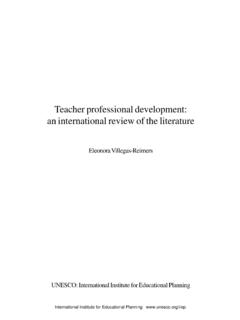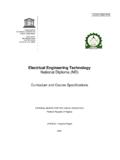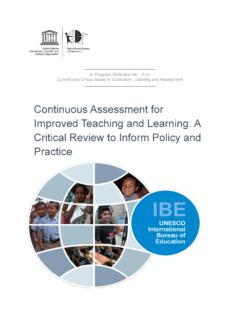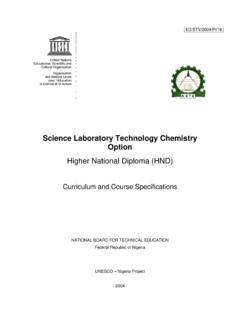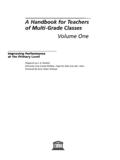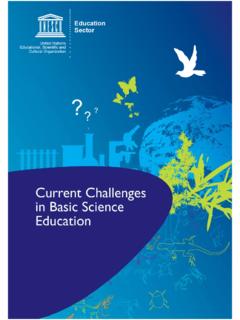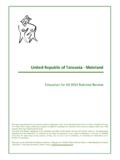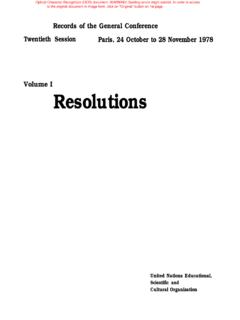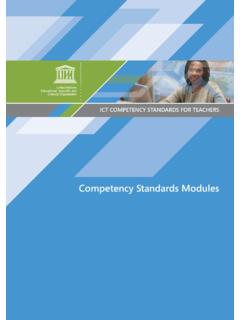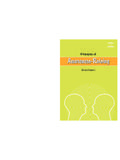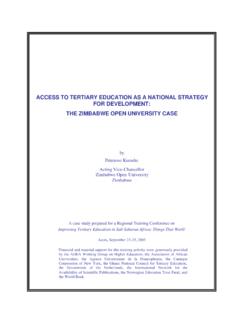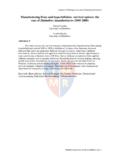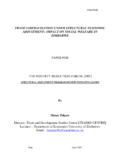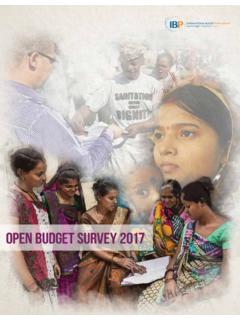Transcription of The Swaziland Education For All review report, 2000-2015; 2015
1 Swaziland Education for All 2015 National review This report was prepared by the relevant national authorities in view of the World Education Forum (Incheon, Republic of Korea, 19 22 May 2015). It was submitted in response to UNESCO's invitation to its Member States to assess progress made since 2000 towards achieving Education for All (EFA). The views and opinions expressed in this document are those of the authors and do not commit UNESCO. The designations employed and the presentation of material do not imply the expression of any opinion whatsoever on the part of UNESCO concerning the legal status of any country, territory, city or area or of its authorities, or concerning the delimitation of its frontiers or boundaries. The paper can be cited with the following reference: Education for All 2015 National review Report: Swaziland . For further information, please contact: The Swaziland Education For All review Report, 2000 2015 This report was prepared by the Ministry of Education and Training in Swaziland together with development partners and representatives from the civil society.
2 It was developed in response to UNESCO's invitation to its Member States to assess progress made since 2000 towards achieving Education for All (EFA) and in view of the World Education Forum (Incheon, Republic of Korea, 19 22 May2015). It was submitted in the UNESCO. regional Office in Harare, Zimbabwe in April 2015. Table of Contents LIST OF FIGURES .. ii ACKNOWLEDGEMENTS .. v FOREWORD .. vi EXECUTIVE SUMMARY .. viii SECTION 1: THE Education FOR ALL (EFA) INITIATIVE AND DEVELOPMENTS SINCE 2000 .. 1 Introduction .. 1 Main EFA challenges in 2002 and targets for 2 Policy Reforms to facilitate the effective implementation of the EFA initiative .. 6 Legislation and Policies in Education .. 7 Institutions responsible for implementing EFA and Coordination Mechanism .. 8 Public Financing Education .. 8 SECTION 2: PROGRESS TOWARDS EFA AND REMAINING CHALLENGES .. 11 SECTION 3: IMPLEMENTATION OF EFA STRATEGIES .. 41 OVERALL LESSONS LEARNT.
3 52 LESSONS LEARNT WITH REGARDS TO EACH EFA GOAL .. 53 Case Studies .. 55 SECTION 4: PROSPECTS FOR POST 2015 .. 59 Proposed targets on the Post 2015 Education Agenda .. 60 Operationalization of the Education Agenda .. 63 Suggested National benchmarks .. 63 Implementation Requirements .. 65 Conclusions .. 66 REFERENCES .. 67 i LIST OF FIGURES Figure 1: Public Expenditure on Education (2000/1 2013/14) .. 9 Figure 2: Apparent Intake Rate: 1999 2012 .. 15 Figure 3: Net Intake Rate: 2009 2012 .. 16 Figure 4: Gross Enrolment Rate; 1999 to 2012 .. 18 Figure 5: Net Enrolment rates Primary: Source AEC, 2012 .. 19 Figure 6: Survival Rates.. 20 Figure 7: Repetition Rate at Primary Level 2010 2012 .. 20 Figure 8: Primary to Secondary Transition Rates: 2010 21 Figure 7: Distribution of Grade 6 Learners Reading Scores. Source: SACMEQ III, 2007 .. 38 LIST OF TABLES Table 1: GER: Pre Primary .. 12 Table 2: New Entrants to Grade 1 (2012).
4 16 Table 3: Survival Rate: 2012 .. 19 Table 4: No. of Trainees and Trainers by type of Institution .. 27 Table 5: Literacy Rates of: 1986 2007 .. 29 Table 6: Gender Parity Primary: GER .. 32 Table 7: Gender Parity Primary: NER .. 32 Table 8: Gender Parity: Higher Secondary GER .. 32 Table 9: Gender Parity: Higher Secondary NER .. 32 Table 10: Means for the reading and mathematics test scores of Grade 6 Learners: 2007 .. 36 Table 11: Reading Competency Levels .. 37 Table 12: Percentage of Grade 6 learners in Various Reading Competency Levels .. 38 Table 13: National benchmark for selected Quality in Primary Education .. 39 Table 14: Sebenta enrolment 2004 to 2011 .. 46 ii ACRONYMS ABE Adult Basic Education AEC Annual Education Census CSTL Care and Support to Teaching and Learning DHS Demographic Health Survey ECCD Early Childhood Care and development ECCE Early Childhood Care and Education ECDE Early Childhood development Education EFA Education For All EMIS Education Management Information System ERS Economic Recovery Strategy ESSP Education Sector Strategic Plan EU SET European Union Support to Education and Training FDI Foreign Direct Investment FPE Free Primary Education Programme GDP Gross Domestic Product HDI Human development Index ICT Information Communication Technology IGCSE International General Certificate for Secondary Education INSET In service Education and Training ISCED International Standard for the Classification of Education MDD Millennium development Declaration MDGs Millennium development Goals MoET Ministry of Education and Training MTEF Medium Term
5 Expenditure Framework NDP National development Plan NDS National development Strategy iii NETIP National Education and Training Improvement Programme NGOs Non Governmental Organizations NPE Non formal Primary Education Programme NQF National Qualification Framework NUPE Non Formal Upper Primary Education OSISA Open Society Initiative of Southern Africa OVC Orphaned and Vulnerable Children PRSAP Poverty Reduction Strategy and Action Programme REOs Regional Education Officers SACMEQ Southern and Eastern African Consortium for Monitoring Educational Quality SACU Southern African Customs Union SELDS Swaziland Early Learning development Standards SHR Sexual Reproductive Health SNI Sebenta National Institute SPC Swaziland Primary Certificate SNAP Swaziland National AIDS Programme TSC Teaching Service Commission TVET Technical and Vocational Education and Training UNESCO United Nations Educational, Scientific and Cultural Organization UNICEF United Nations Children Education Fund WHO World Health Organization iv ACKNOWLEDGEMENTS The Ministry of Education and Training would like to make special thanks to all members of the Education sector who made it possible to put together this report.
6 Compiling this report called for the participation of various key stakeholders. Without their active involvement, it would not have been possible to undertake the compilation of the report. These stakeholders include: officials of government ministries, which include the Ministry of Labour and Social Security, the Ministry of Health and Social Welfare (School Health Department), the Deputy Prime Minister's Office (Children's unit, Social Welfare department, Gender Unit and Disability unit); representatives from teachers' union, International development partners such as UNESCO and UNICEF; NGOs such as world vision; and academics from the University of Swaziland . We are also grateful to line Ministries, Non Governmental Organizations (NGOs) and all other agencies that provided facts and figures that enabled us to produce this report about Swaziland 's journey towards realizing the EFA Goals and to share with the rest of the world on what are the prospects for Education in Swaziland beyond 2015.
7 The assistance of the EFA Coordinating Committee and in particular the National EFA Coordinator is greatly appreciated. The EFA coordinator was very key in arranging meetings and consolidating this report. Lastly, we would like to express our sincere gratitude to all our development partners; UNESCO, UNICEF, the European Union, the Government of the Republic of China on Taiwan, the Government of Japan, PACT, World Vision, NGOs to name a few; for their continued support in the implementation of the EFA as well as in their technical and financial contribution to the development of this report. v FOREWORD Education FOR ALL STATUS REPORT 2002 TO 2015, Swaziland It gives me great pleasure to release this Education for All Status report that incorporates a summary of the interventions we have made, and plans to strengthen our Education system. This Education for All Status Report 2000 2015 maps out the progress Swaziland has made in achieving the Dakar goals agreed at the World Education Forum in 2000.
8 The goals agreed in Dakar helped Swaziland to refine the implementation of the National development Strategy (NDS) of 1997 which guide development and growth of the Education and training sector. As a country, we have been able to re strategize and prioritize Education in our national budget resulting in increased spending on Education in real terms. Since 2010, we have made progress in expanding access to primary Education for all children including orphans and vulnerable children as well as children with special Education needs. We have also made significant progress in improving access to literacy programmes and eliminating in equalities such as rural urban and gender disparities in primary and secondary Education . Furthermore, Swaziland has taken significant steps in terms of providing policy and strategic direction in the provision of Early Childhood development Programmes through the development of the ECDE Policy (which is still a draft policy) and the adoption of Early Learning and development Standards.
9 Despite these achievements, Swaziland still faces a number of challenges. These include the low participation rates at ECCE and secondary Education levels, ensuring quality throughout the Education system, inefficiencies in the Education system, limited role played by the civil society and the private sector in supporting Education and training. The low participation rates at ECCE and secondary Education levels are largely attributed to poverty. A majority of children cannot access Education due to financial barriers (MICS Report, 2010). Quality and relevance of Education have remained one of the priority areas for the Education system in Swaziland . In pursuit of these, during 2013, the Ministry with support from partners such as UNICEF, the Open Society Initiative of Southern Africa (OSISA) and the EU started working on the articulation of the ECCE curriculum and the development of a competency based curriculum for the basic Education level.
10 The aim is to articulate a strong and coherent curriculum that will provide all learners with skills and competencies necessary for the 21st century. The Ministry with support from partners, continues to roll out the life skills programme both at primary and secondary Education levels. It is expected that it will have a positive impact on the lives of learners leading to safer behaviour patterns. In addition to this, the intervention at secondary Education level include offering an Education that presents opportunities to a variety of career paths. This is being done vi through the introduction of practical subjects that equip learners with essential skills for them to be self sustainable in future. Special attention is being place also on improving the learning and teaching of subjects such as Mathematics, Science and ICT. I extend my grateful thanks to all those who have contributed to this report and more specifically to those who were involved in the implementation of the EFA.
